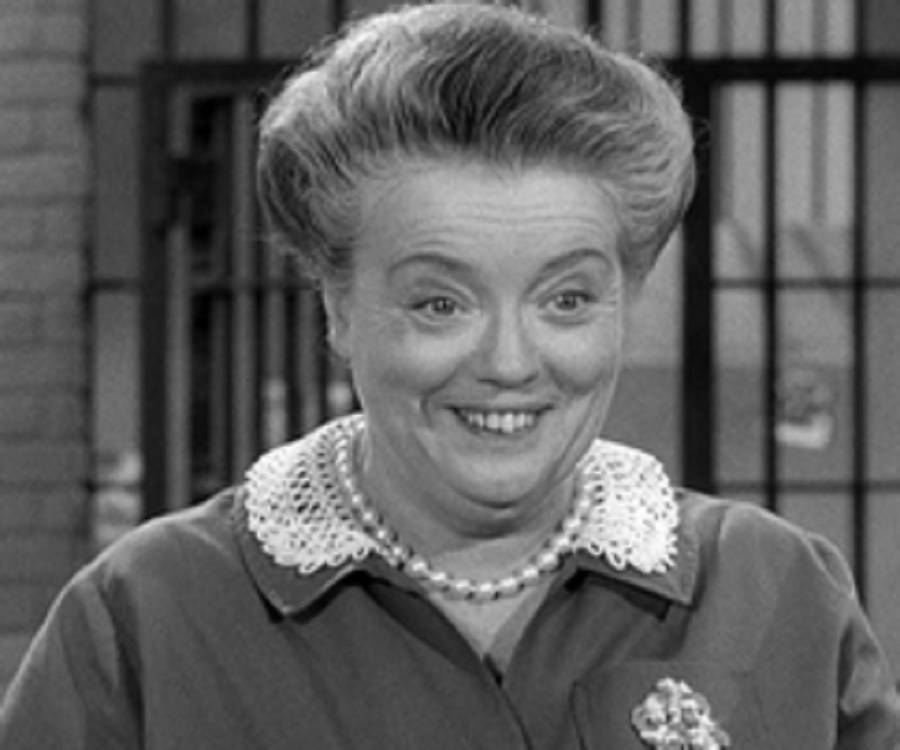Frances Bavier was truly one of television’s great women, and her role as “Aunt Bee” on the venerable comedy series “The Andy Griffith Show” cemented her place in history.
In my perspective, Bavier performed a fantastic job in one of the most morally upstanding TV show series ever produced.
But the actress, who received classical training in New York, was actually very dissimilar from the rustic role she played. She occasionally disagrees with the “kids” on the set due to her sophistication and age.

Many tales about the endearing “Aunt Bee” began to spread after “The Andy Griffith Show” ended; it was claimed that Frances Bavier was quite unpleasant to her coworkers and that she detested her part. Some claim that the actress disapproved of the swearing and joking that took on behind the scenes.
Her dying days have been characterized as tragic, but was that entirely accurate? It turns out that the perception of Bavier is a lot more nuanced and complex than most people realized.

Read More: Parents Want Home Economics To Be Taught In Schools Again To Teach Kids Basic Life Skills
In Manhattan, New York, Frances Bavier was born in the year 1902. Frances’s mother was a stay-at-home mother, while her father worked as a stationary engineer. Bavier first attended Columbia University with the goal of becoming a teacher while still a teen. But for the young woman, her time at university quickly became a nightmare.
“I was bad there,” Bavier told The Charlotte News, continuing:
“Very bad. Actually, I was terrified. That’s probably the reason I enrolled at the American Academy of Dramatic Arts.”

Frances, who had a passion for acting and the theater, first tried to make a fortune in vaudeville before taking a chance on the Broadway stage. However, the talented actress wanted to improve her performance, so she enrolled at the American Academy of the Arts and graduated in 1925.
Her big break came when she was cast in “On Borrowed Time” on Broadway. When the US entered World War II, Bavier went to the Pacific with the USO to amuse American troops and provide some entertainment in a difficult situation.
Frances made her television debut in the 1952 episode of the crime drama series “Racket Squad” after the war. Frances is talented and beautiful. Following that, Bavier had a smooth time landing roles in both films and television shows.
But she still had to play her biggest and most important role.

It’s actually unclear if Frances was married or not, which may surprise you. Although there are numerous sources that disagree with one another, if we are to believe Frances herself, she has been married before.
According to rumors, her husband was military officer Russell Carpenter. According to legend, the couple was married from 1928 to 1933.

During a 1964 interview with the Star-Gazette, Frances is alleged to have discussed her marriage.
“I married a man who was charming in every way, except that, being non-professional, he had little patience with my dedication to acting. I wanted to be both wife and actress, but learned quickly that this is impossible, at least in my specific case. To paraphrase Shakespeare, it was not that I loved him less, but I loved acting more.
I know that many psychologists, particularly women psychologists, hold that a woman can have both a home and a career. But that is generally not the husband’s point of view and I sympathize entirely with the man who wants his wife to be completely devoted to him and their children,” Frances said.
Bavier appeared in a “Make Room for Daddy” episode with Andy Griffith and Ron Howard; this was the start of a change that would affect her entire life.
Beginning with that episode, Bavier starred as “Aunt Bee Taylor,” the paternal aunt of widowed Sheriff Andy Taylor who was renowned for her Southern cooking prowess, on “The Andy Griffith Show.”

The fictional town of Mayberry’s residents rose to fame for upholding the rigorous moral standards of the 1950s and 1960s during the heyday of the television series.
More than any other character, Frances Bavier played a part in Mayberry for ten years. In 1967, she was honored with an Emmy Award for her portrayal of the endearing “Aunt Bee”.
However, rumors have claimed that she was unkind and challenging on site.She frequently disagreed with Andy Griffith and was known for being “standoffish and a prima donna”.

“[She] was a rather remote lady. Highly professional and a fine comedienne, fine actress with very individual character. She was rather self-contained and wa not part of the general hi-jinks that centered upon Andy on the set,” producer Sheldon Leonard said in The Andy Griffith Show Book.
Frances’ feelings toward her well-known role were mixed. She felt “trapped” by her persona and preferred to be recognized as Frances Bavier rather than Aunt Bee.
”It is very difficult for an actress … to create a role and to be so identified that you as a person no longer exist and all the recognition you get is for a part that is created on the screen,” Frances admitted in an interview with Bill Ballard.

At the same time, there were certain advantages to being known all throughout the nation, particularly for Frances, who worked in California, a long way from home.
“Whenever I feel lonely out here, I just go out shopping in a supermarket. Somebody will always look at me, smile and say, ‘Why hello, you’re Aunt Bee,’” she told The Charlotte News in 1961.
Griffith acknowledged calling Bavier four months before to her passing and apologized for being unpleasant on set during an interview with Larry King Live in 1998.
That she would really apologize to someone for her acts must have required a great deal of guts and deep introspection.
“She was very touchy and moody due to her age, and you had to be very careful how you treated her and what you said around her. I think Andy offended her a few times, but they became very close friends,” producer Richard Linke said.

In 1972, Frances Bavier gave up performing and moved into the small community of Siler City, North Carolina. The Manhattan native, however, struggled to fit in with the 3,700 residents of the little American hamlet.
Locals perceived her as “a 70-year-old lady who probably wants to be alone and they’re having a problem with trying to be friendly and show their friendliness, while at the same time not intrude,” according to a local TV interview.
Read More: Aunt Jemima’s” great-grandson angry that her legacy is being scrapped: “It’s injustice to my family”
They find it quite challenging as a result. I’ve had a hard time adjusting to living here. North Carolina and Siler City have a lot to teach me. It’s a completely new way of living,” Frances declared.
Frances led a very simple and quiet existence in the final years of her life. She hardly ever gave interviews or appeared in public. She allegedly turned into a recluse with her several cats.

“I think she was a person who obviously valued her privacy. She . . . could have had non-stop fans if she had opened her doors,” Diana Hatch, communications director for University of North Carolina Center for Public Television, told LA Times.
Frances turned down an invitation to play the lead in the television movie “Return to Mayberry” in the late 1980s. She was far too unwell, in Andy Griffith’s opinion, to reprise the part of “Aunt Bee.”
“Frances wanted to do the movie, but she told me she simply didn’t want anyone to see how sick she was. She lives by herself, rarely talks to anyone and hopes people will remember Aunt Bee the way she was,” Andy told The News and Observer.
Frances Bavier passed away in 1989, eight days before turning 87. She was afflicted with numerous illnesses, which eventually overcame her body. Congestive heart failure, myocardial infarction, coronary artery disease, and atherosclerosis were identified as the immediate causes of her death.
The reclusive actress spent her final days in a large back room ”plainly furnished with a bed, a desk, a television and an end table, where she kept her reading and opera glasses, black licorice and a bell.”

Few valuable items were left behind by Frances, and the house was far from the cozy setting of “Aunt Bee’s” imaginary home in Mayberry. It was clear that Frances had little time to devote to caring for her house and was either unable or unwilling to do so.
Personally, I believe that up until the point where she was too elderly and unwell, she was more than capable of caring for her home and her cats. Many elderly persons experience this; they eventually realize that some tasks simply cannot be completed without assistance. Since we don’t fully understand her life, we can’t properly criticize her.
But one thing is certain: Frances had a large heart, as evidenced by her dying wish. She bequeathed her money to the neighborhood police force when she passed away. Her estimated $700,000 estate was given to a hospital foundation, and the public television network received her dated possessions.

Frances, we appreciate you being here. I am one of the many individuals you made happy, therefore may you rest in peace.





